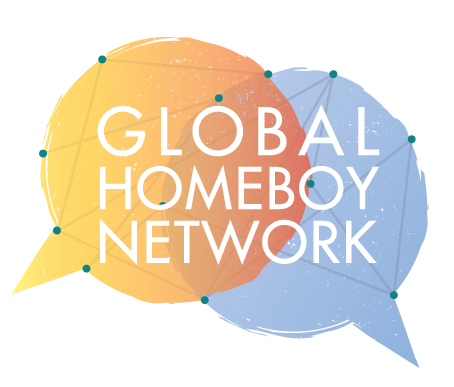Global Homeboy Network Conference

B&R Invited by Father Boyle to Present Workshop on Ould El Dar (Homeboy in Arabic) for the Global Homeboy Network Conference 2017
If you haven't heard of one of America's leading Social Enterprises, Homeboy Industries, please do yourselves a great favor and check them out: www.homeboyindustries.org Walking into that building is like walking into a warm embrace. The place is buzzing with activity (tattoo removal, meditation, self improvement classes, job placement, etc...). And of course there is the Homegirl Cafe (delicious food!) attached to the building.
Homeboy was brought to life 30 years ago by Father Gregory Boyle, a Jesuit priest from Los Angeles. (Here’s a 1992 60 Minutes Report: https://www.youtube.com/watch?v=FnF_i5tJxCs . It started with Father Boyle listening to the community to find out how he can help end gang culture and gang violence. So he asked, and he listened: what did these young men and women need and want, truly? Jobs, they said. Purpose. And of course, healing. Since then, Father Boyle, the community and a huge group of dedicated volunteers and employees have rallied to make Homeboys a successful place of hope and a successful social enterprise to boot.
Today, Homeboys has one of the largest silk-screening services in the country, they have 3 cafes (Go to Homegirl Cafe downtown at the Homeboy building, or try the cafes at City Hall or LAX), a successful catering business, and they have managed to scale their salsa, guacamole and chips at stores like Ralph's and Gelson's. And the list goes on...
So what does Homeboys have to do with Balthazar & Rose, a small social enterprise with big dreams of systems change? Well, a lot it turns out. A series of cool coincidences and a really big gut feeling made me approach the Homeboys Employment Services to ask if I could kindly work with the Homeboys from time to time to package our soaps. I knew that it had to do with Tunisia somehow, but I didn't know what exactly. My guess was transpersonal healing. That somehow, through the act of engaging with each other, and this product that comes all the way from Tunisia, touching the same soap, sitting around a table and packaging together, chatting, telling stories, getting to know one another...that some healing would take place here in LA and abroad in Tunis.
About a month after first approaching Homeboys, I read an article in The New Yorker by George Packard (http://www.newyorker.com/magazine/2016/03/28/tunisia-and-the-fall-after-the-arab-spring) describing how despite the 2015 Nobel Peace Prize and investment money coming in from foreign countries to help Tunisia's young, new democracy survive, that Tunisia remained the largest exporter of Jihadists in all of the Maghreb. I put the article away but it haunted me. I thought about it often, shared it often. Less than a year later, something made me read it again more attentively, and this time I was even more stunned. Was it still that bad? And what could we do? I turned to my husband Karim, a Franco-Tunisian, and said: "Hey wouldn't it be great if the Homeboys model existed in Tunisia?". Now of course this is a problem that the world is trying to solve...but still, it was a question worth asking. Karim stopped a second and said "Huh, I just realized that we have exactly the same expression in Arabic: Ould el Dar (Ould is Boy and el Dar is Home) and Bint el Dar (Bint is Girl and el Dar is Home). And it has the exact same connotation". As he said this, he flung one arm around an imaginary friend and looked at him with such compassion. It stopped me in my tracks and time seemed to stop. There was a Higher Plan.
So...here we go! Let's see how we can make this happen. No delusions here: we're starting with a practical plan and reaching out to partners. It will take a huge Team on the ground in Tunisia and so many resources, volunteers, funding. It may even take a decade. We won't know until we try. One step at a time, starting with being asked by Father Boyle (wow) to present a small workshop at the upcoming 4th Annual Global Homeboys Network Conference, where people from around the United States and the globe come to learn from Homeboys and to take lessons and techniques learned back to their respective cities to implement.
With Hope,
Balthazar & Rose
